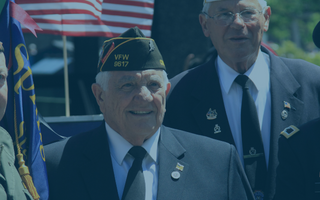VA Aid & Attendance Program
 The Veterans Pension program is often overlooked and underutilized as a financial benefit for qualifying veterans and their surviving spouses who are age 65 or older, or, if under 65, who are permanently and totally disabled due to non-service-connected conditions. This is different from the more well-known Veterans Compensation program for Veterans who sustain a service-connected disability. A service-connected disability is not required to qualify for Veterans Pension. It can be especially beneficial when a Veteran or surviving spouse of a Veteran has started paying privately for long-term care services. The Veterans Pension program is administered by the Veterans Benefits Administration (VBA), the financial benefits arm of the Veterans Administration, and provides monthly payments to wartime Veterans (or a surviving spouse of a wartime Veteran) who meet certain age or disability requirements, and who have income and assets within certain annually designated limits.
The Veterans Pension program is often overlooked and underutilized as a financial benefit for qualifying veterans and their surviving spouses who are age 65 or older, or, if under 65, who are permanently and totally disabled due to non-service-connected conditions. This is different from the more well-known Veterans Compensation program for Veterans who sustain a service-connected disability. A service-connected disability is not required to qualify for Veterans Pension. It can be especially beneficial when a Veteran or surviving spouse of a Veteran has started paying privately for long-term care services. The Veterans Pension program is administered by the Veterans Benefits Administration (VBA), the financial benefits arm of the Veterans Administration, and provides monthly payments to wartime Veterans (or a surviving spouse of a wartime Veteran) who meet certain age or disability requirements, and who have income and assets within certain annually designated limits.
Veterans Aid and Attendance Benefit Eligibility
The basic eligibility criteria for Veterans Pension include the following:
- The Veteran served at least 90 days of active military service, 1 day of which was during a wartime period; or if the Veteran entered active duty after September 7, 1980, and served at least 24 months or the full period for which called or ordered to active duty (there are exceptions to this rule), 1 day of which was during a wartime period; and
- The Veteran was discharged from service under conditions other than dishonorable; and
- The Veteran’s countable family income is below a yearly limit set by law (the yearly limit on income is set by Congress); and
- The Veteran is age 65 or older or permanently and totally disabled, and now requires the assistance of another person.
A surviving spouse of a wartime Veteran who has not remarried may also be eligible for Pension if the deceased Veteran met the requirements above. The surviving spouse must also have limited income and assets, and be over 65 or disabled and require the assistance of another person.
Aid and Attendance (A&A) is a benefit that may be paid in addition to the monthly pension if the additional criteria for A&A is met. This benefit may not be paid without eligibility for pension. To be eligible for A&A benefits, the claimant must require the aid of another person to perform activities of daily living, such as bathing, feeding, dressing, toileting, or transferring. A claimant may also be eligible when bedridden, a patient in a nursing home due to mental or physical incapacity, or blindness. Housebound is another benefit that may be paid in addition to the monthly pension when the claimant is permanently and substantially confined to his or her immediate premises due to medical disability. The Veterans Administration will consider a claim for Housebound benefits if a claimant is denied Aid and Attendance benefits.
Income and Net Worth Limitations
Besides meeting the basic eligibility criteria and any additional criteria for Aid and Attendance or Housebound benefits, the claimant must also meet the income and net worth limitations. Net worth is defined as the net value of the assets of the Veteran and his or her spouse and dependents, if any, plus annual income. It includes such assets as bank accounts, certificates of deposit, stocks, bonds, mutual funds, cash value of life insurance policies, and any real estate other than the Veteran’s residence and 2 acres. Also excluded from net worth is one vehicle, pre-funded funeral policies for the Veteran and spouse, and tangible personal property. In 2022, the net worth limit is $138,489.
Countable income for pension eligibility purposes is income received by the Veteran and his or her spouse and dependents, if any, from most sources, including earnings, disability and retirement payments, interest and dividends, and net income from farming or business.
To calculate the VA Pension, all countable income is totaled. Then, any out-of-pocket recurring medical expenses are deducted from total gross income. The remaining countable income, if any, is deducted from the appropriate annual pension limit, which is determined by the number of dependents, if any, and whether the Veteran is entitled to Housebound or Aid and Attendance benefits. This amount is then divided by 12 and rounded down to the nearest dollar for the monthly payment amount.
To find information on applying for this benefit, go online to www.va.gov, contact your local Veterans Service Office and make an appointment to speak with a Veterans Service Officer, or schedule a meeting with an attorney who is licensed to practice before the VA to review your circumstances and assess your eligibility.
